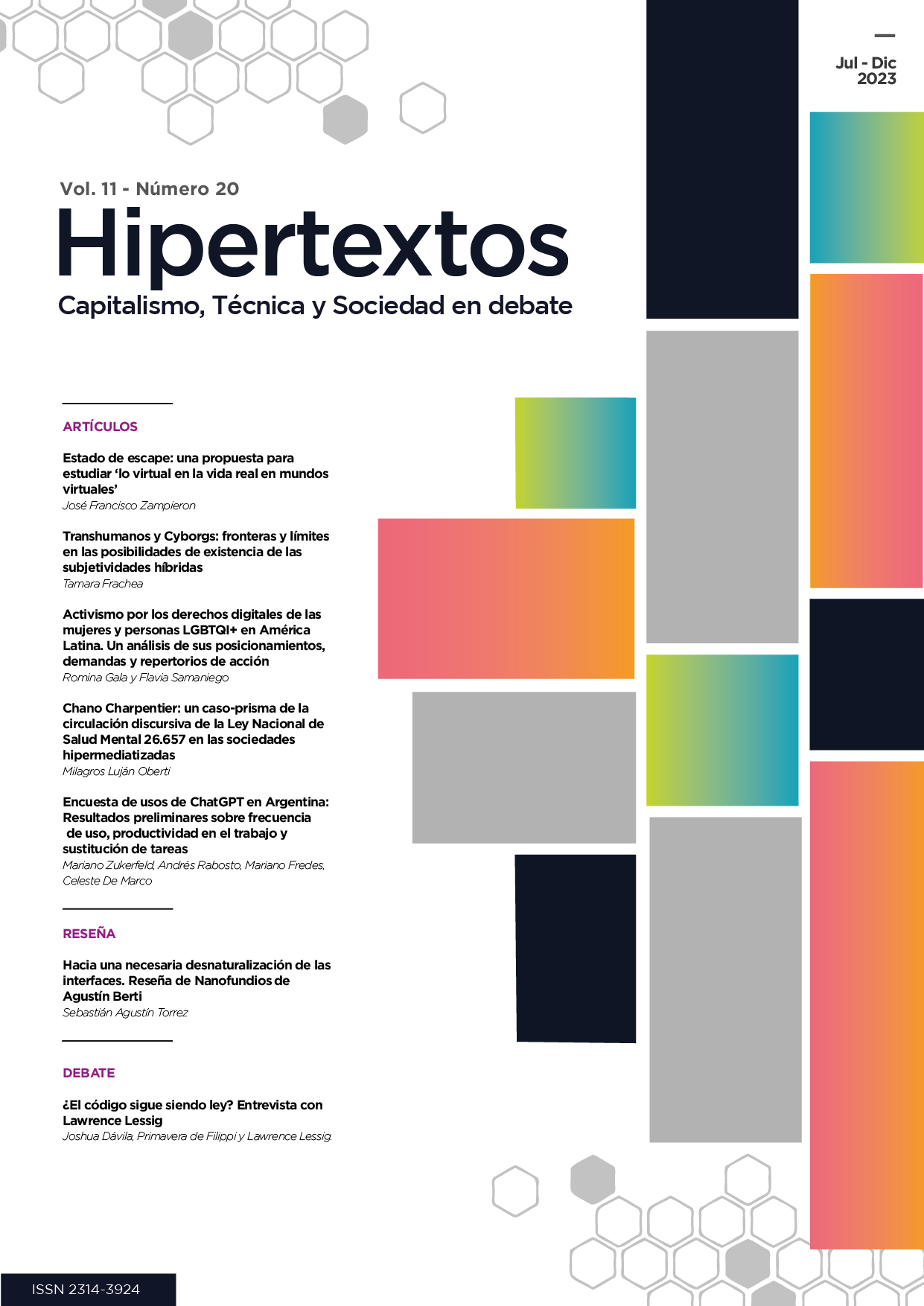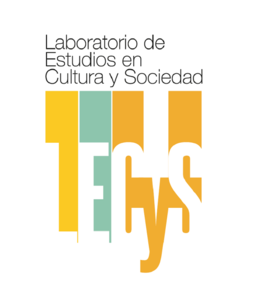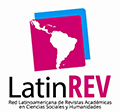Transhumans and Cyborgs: Boundaries and Horizons in the Possibilities of Existence of Hybrid Subjectivities
DOI:
https://doi.org/10.24215/23143924e072Keywords:
filosofía positiva, prácticas de sí, cyborgismo, transhumanismo, teoría críticaAbstract
This paper aims to reflect on the internal boundaries and horizons projected through the transhumanist and cyborg movements. Both actors, cyborgs and transhumans, present themselves as a type of hybrid subjectivity that originates in the body/machine - mind/software alloy. In the current stage of capitalism, scientific and technological developments have a broad impact on societies and the individuals within them, at different levels and intensities. In this sense, it is of interest to consider the voices of the actors of both movements with a perspective that, within the positions of cognitive capitalism, considers in the differentiation between cyborgs and transhumans the different perspectives on the role of science and technological progress in societies. This analysis aims to expand the view towards new forms of life, perceptions of oneself, others and the world around. Expert knowledge, technological development, digital information and its influence on the minds and bodies of individuals open the doors to explore these types of subjectivities that are formed in the alloy with the improvements that technology can offer.
Downloads
References
BBC. (11 de enero de 2016). Bowie talks to Paxman about music, drougs and the internet. BBC. https://www.bbc.com/news/av/entertainment-arts-35286749
Bramuglia, C. (1999). La tecnología y la Teoría Económica de la Innovación [Documentos de Trabajo, 15]. Instituto de Investigaciones Gino Germani, Facultad de Ciencias Sociales, Universidad de Buenos Aires.
Cafassi, E. (1998). Bits moléculas y mercancías (breves anotaciones sobre los cambios en el submundo de las mercancías digitalizadas). En S. Finquelevich y E. Schiavo (Comp.), La ciudad y sus TICs: tecnologías de información y Comunicación. Universidad Nacional de Quilmes.
Castells, M. (1997). La era de la información. Alianza.
Canal LA GATA DE SCHRÖDINGER. (6 de Mayo de 2021). Dentro del BÜNKER de los CYBORGS: “No me siento 100% humano” [Entrevista]. Youtube. https://youtu.be/UEpDwHHpt4g
Dsruptive. (2022). Home; about. https://dsruptive.com/
Feyrabent, P. (1987). Adiós a la Razón. REI.
Foucault, M. (2002). La ética del cuidado de sí como práctica de la libertad. En C. Gómez (Ed.), Doce textos fundamentales de la Ética del siglo XX (pp. 256-264). Alianza.
Frachea, T. (2019). Ser Cyborg: Subjetividades Hibridas en el Capitalismo Cognitivo. Potencialidades y límites. Hipertextos, 7(12), 68-97. http://doi.org/10.24215/23143924e004
Fundación Cyborg. (2020). Cyborg fundation. https://www.cyborgfoundation.com/
Gandini, E. (Dir.). (2015). La Teoria Sueca del Amor [Película]. Producida por Erik Gandini.
Glavich, E. (1995). Sociedad de la alta tecnología. La historia de la revolución de la tecnología de la información. Redes: Revista de Estudios Sociales de la Ciencia, 2(4), 195-200.
Habermas, J. (1980). Ciencia y Tecnología como ideología. Alianza.
HumanityPlus. (2021). Our mission: Humanity+ aka Humanity Plus. What We Do. https://www.humanityplus.org/about
Horkheimer, M. (1969). Crítica de la razón instrumental. SUR.
Katz, C. (1996). La concepción marxista del cambio tecnológico. Pensamiento Económico (1), 155-180.
King-Ho, L. (2020). The technologisation of Grace and Theology: Meta-theological insights from transhumanism. Studies in Christian Ethics 2020, 33(4) 479-495.
La Vanguardia. (3 de Noviembre de 2018). Suecia, un pais de cyborgs. La Vanguardia. https://www.lavanguardia.com/tecnologia/20181103/452692821489/suecia-microchips-implantes-movil-biohacking.html
Lessig, L. (2009). Code and other Laws of Cyberspace. Basic Books.
Manfred, E. C. y Nathan, S. K. (Septiembre 1960). Cyborgs and Space. New York Times. https://archive.nytimes.com/www.nytimes.com/library/cyber/surf/022697surf-cyborg.html
Marx, K. (1975). El Capital. Siglo XXI.
Marcuse, H. (1993). El hombre unidimensional. Planeta-Agostini.
More, M. (2021). La filosofia del transhumanismo. https://www.humanityplus.org/philsophy-of-transhumanism
Nextnature. (2021). Cyborgnest: redefining human senses. https://nextnature.net/magazine/story/2021/cyborgnest
Transespecies Society. (2018). Transpecies Society. https://maneliquid.portfoliobox.net/transpeciessociety
Thomas, H. (2010). Los estudios sociales de la tecnología en América Latina. Iconos, (37), 35-53.
Pagina12. (22 de Octubre de 2012). Me puedo vestir de una cancion si quiero. Página 12. https://www.pagina12.com.ar/diario/dialogos/21-206085-2012-10-22.html
Wawrzinek, L. (Dir.). (2017). Cyborgs Human Machines [Película]. Producida por Olaf Jacobs.
Weber, M. (1997). Ensayos sobre metodología sociológica. Amorrortu.
Weber, M. (1998). Ensayos sobre sociología de la religión. Taurus.
Winner, L. (1986). La ballena y el reactor. Una búsqueda de los límites en la era de la alta tecnología. Gedisa.
Zukerfeld, M. (2005). Bienes informacionales y capitalismo. En AA. VV., Concurso Pensar a Contracorriente, Tomo II. Editorial Ciencias Sociales.
Zukerfeld, M. (2010). La expansión de la Propiedad Intelectual: una visión de conjunto. En M. Casalet (Comp.), El papel de las Ciencias Sociales en la construcción de la Sociedad del Conocimiento: Aportes de los participantes al Summer School de EULAKS. FLACSO.
Downloads
Published
How to Cite
Issue
Section
License

This work is licensed under a Creative Commons Attribution-NonCommercial-NoDerivatives 4.0 International License.

























